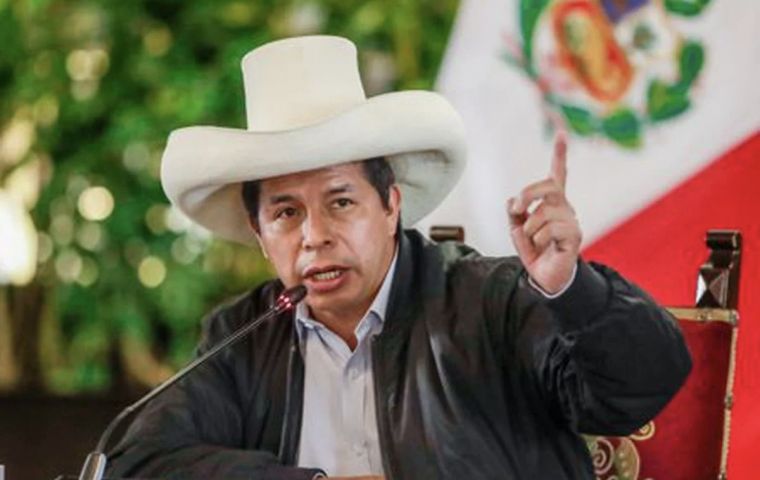MercoPress. South Atlantic News Agency
Lima Court rejects habeas corpus for Castillo
 A group of lawyers defending Castillo had argued he was still President due to a technicality
A group of lawyers defending Castillo had argued he was still President due to a technicality Peru's Judiciary Monday rejected a habeas corpus request filed by former President Pedro Castillo Terrones' legal counselors to spare the former head of state the 18 months' pre-trial detention he has been sentenced to pending a resolution on the case against him for trying to dissolve Congress and rule by decree.
In denying the request, Justice Gisela Haydee Ocaña Chalco of the Sixth Constitutional Court of Lima also failed to reverse Castillo's impeachment, according to El Comercio.
Castillo is currently under arrest at the Barbadillo prison, the same facility where former President Alberto Fujimori is serving a sentence for crimes against humanity.
Peru's National Federation of Lawyers of Peru, petitioning on behalf of Castillo, argued that, in order to be arrested and tried, his presidential immunity should have been lifted first, a procedure that was not carried out and, hence, Castillo would technically continue to be the president.
Prosecutors said the pre-trial detention was “founded” because “the existence of a strong suspicion [of Castillo] as alleged co-perpetrator of the crime of rebellion and conspiracy against the powers of the State and the constitutional order” had been determined, in addition to the flight risk posed by Castillo, who had sought refuge at the Mexican Embassy in Lima before being captured.
Regarding the non-lifting of Castillo's immunity, the State Attorney's Office points out that this action applied “in the case of clandestine crimes, not flagrant.”
Since Castillo's dismissal and arrest, Peru has been going through a political and social crisis, with massive protests throughout the country that have ended in clashes between demonstrators and the Police.
According to the Ombudsman's Office, 60 people died during the demonstrations: 48 civilians “in confrontations”, another 11 “due to traffic accidents and events related” to road blockades, and one policeman who was burned alive.
The Peruvian government declared a state of emergency to deal with the demonstrations, amid criticism from rights groups.
A former teacher and union leader from a small town in northern Peru, Castillo faced allegations of corruption and two prior impeachment attempts in less than two years in office. But he has maintained a strong base among rural voters and disenfranchised Indigenous groups.




Top Comments
Disclaimer & comment rulesCommenting for this story is now closed.
If you have a Facebook account, become a fan and comment on our Facebook Page!